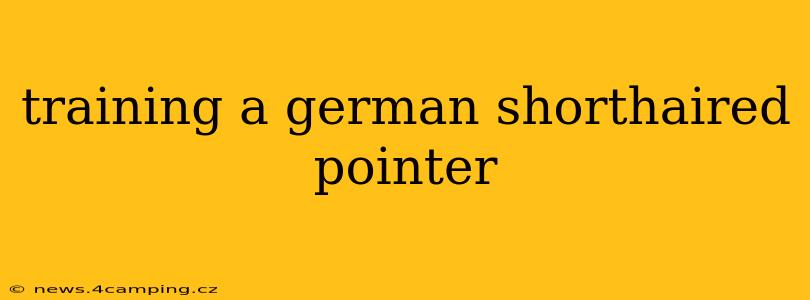The German Shorthaired Pointer (GSP), a breed known for its intelligence, energy, and hunting prowess, requires consistent and engaging training. Their eagerness to please makes them relatively easy to train, but their high energy levels necessitate a structured approach. This guide will cover various aspects of GSP training, addressing common questions and providing expert advice.
What is the best way to train a German Shorthaired Pointer puppy?
Puppy training for a GSP should focus on socialization and basic obedience. Start early, ideally from 8 weeks old. Focus on positive reinforcement methods, using treats, praise, and toys to reward desired behaviors. Short, frequent training sessions (10-15 minutes) are more effective than long, tiring ones. Introduce your puppy to various environments, sounds, and people to prevent fear-based aggression later. Basic commands like "sit," "stay," "come," and "down" should be mastered early. Enroll in puppy classes to socialize your GSP and receive professional guidance. Remember, consistency is key.
How do I train a German Shorthaired Pointer to hunt?
Hunting training for a GSP requires patience and specialized techniques. Start with basic retrieving exercises using dummies or birds. Gradually increase the difficulty by introducing longer distances and varying terrains. Focus on developing their natural pointing instinct through scent work and controlled exposure to game birds. Consider working with a professional hunting dog trainer who can provide expert guidance and tailor the training to your specific hunting style and location. Safety is paramount – always supervise your GSP closely during hunting training.
What are some common problems with German Shorthaired Pointers and how to fix them?
GSPs, with their energetic nature, can exhibit some common behavioral issues. Excessive barking can often be addressed through training in impulse control and providing sufficient mental and physical exercise. Jumping can be curbed with consistent training using commands like "off" and rewarding calm behavior. Destructive chewing often stems from boredom or lack of exercise; providing adequate mental and physical stimulation can mitigate this. Stubbornness, though sometimes perceived as a breed characteristic, usually responds well to positive reinforcement and consistent training. If problems persist, consider consulting a certified professional dog trainer or veterinary behaviorist.
How do I socialize my German Shorthaired Pointer?
Socialization is crucial for a well-adjusted GSP. Expose your puppy to various sights, sounds, people, and other animals from an early age. Controlled interactions with other dogs, under supervision, help build appropriate social skills. Positive experiences during this crucial period help prevent fear and aggression. Regular visits to parks, pet stores (with careful management), and other public places (with appropriate leash training) provide valuable socialization opportunities.
At what age should I start training a German Shorthaired Pointer?
Ideally, you should begin basic obedience training with your GSP puppy as early as 8 weeks old. This allows you to establish a strong foundation for future training and helps to prevent the development of unwanted behaviors. While formal hunting training may be postponed until they are a bit older (typically 6-12 months), early socialization and basic obedience are essential for a well-rounded dog.
How long does it take to train a German Shorthaired Pointer?
Training a GSP is an ongoing process, not a one-time event. While basic obedience can be achieved within a few months of consistent training, mastering advanced commands and hunting skills requires ongoing dedication and patience. The time commitment varies greatly depending on the dog’s temperament, your training methods, and your goals. Remember that consistent effort and positive reinforcement are key to success.
What are some good training tools for a German Shorthaired Pointer?
Positive reinforcement training is highly effective for GSPs. Use high-value treats, praise, and toys to reward good behavior. A comfortable and well-fitting collar and leash are essential. Consider a clicker for marking desired behaviors and enhancing training efficiency. Avoid harsh punishment methods as they can damage the dog's trust and hinder progress.
This comprehensive guide provides a strong foundation for training your German Shorthaired Pointer. Remember that consistency, patience, and positive reinforcement are vital for success. If you encounter significant challenges, seeking guidance from a professional dog trainer specializing in GSPs or hunting dogs can significantly enhance your training journey.
